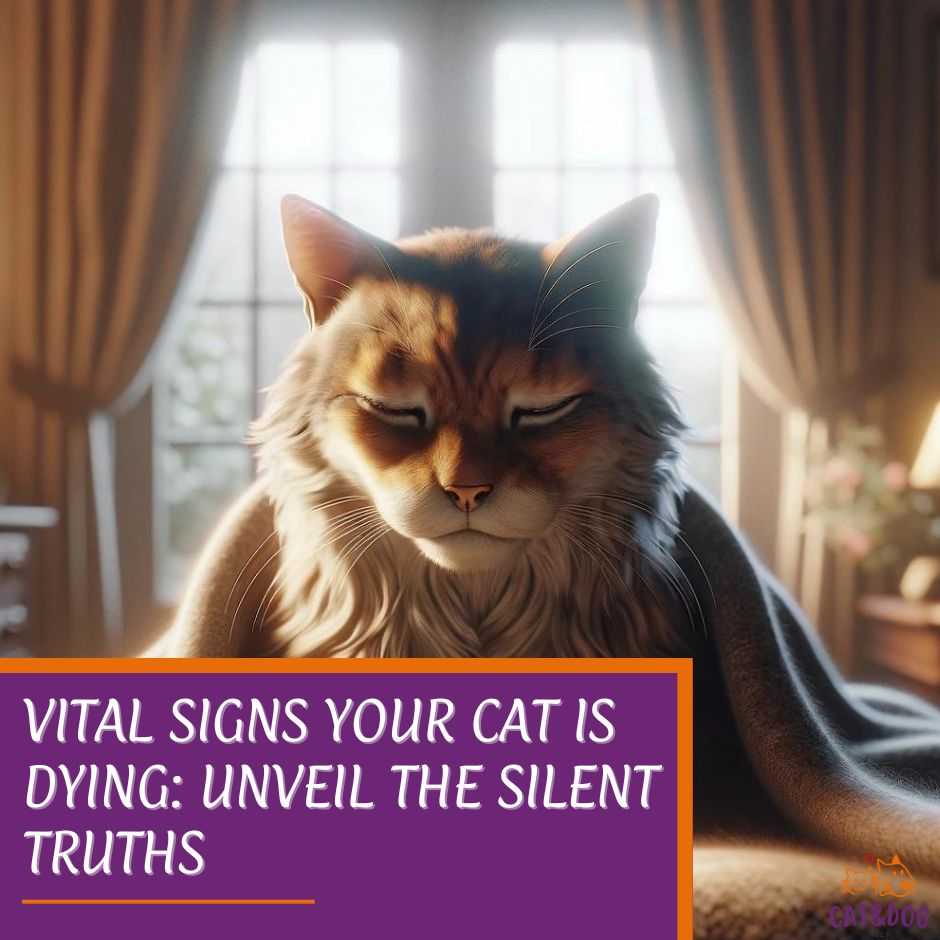Recognizing when your beloved feline friend is nearing the end of their life is a profound and delicate matter.
As a pet owner, it’s crucial to observe your cat for subtle changes in behavior or routine that could indicate they’re not feeling well.
Cats are masters at hiding discomfort and illness, but as they approach their final days, certain signs your cat is dying may emerge. (1)
It’s important to approach this topic with both sensitivity and attentiveness to ensure your cat’s comfort and dignity during their final stage of life.
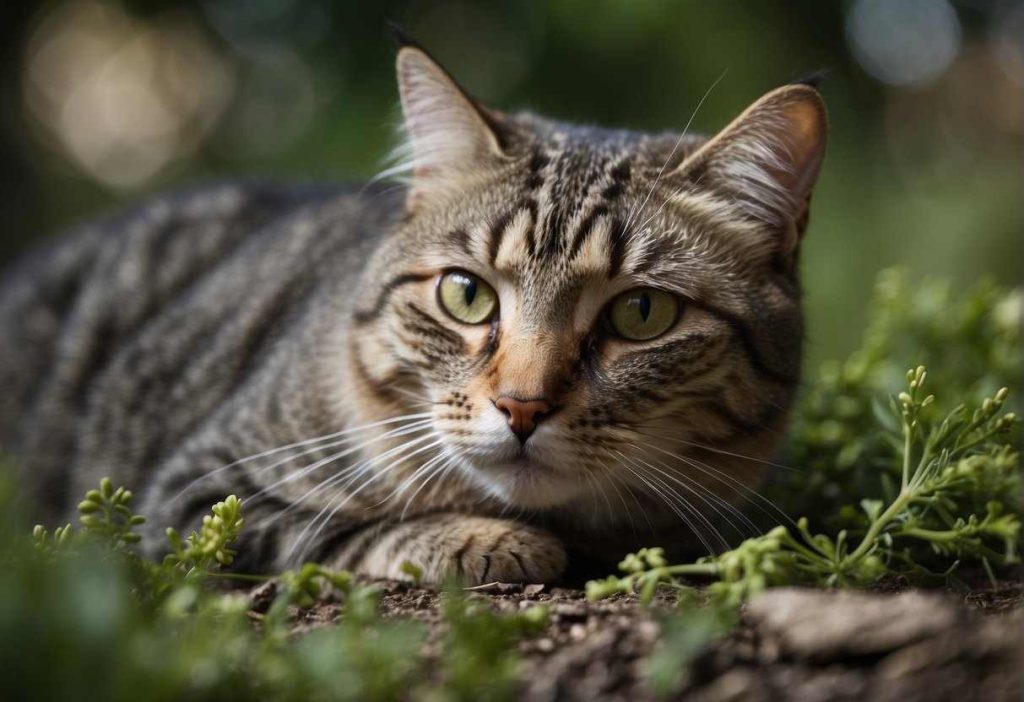
You may notice several changes, such as a decrease in your appetite or a withdrawal from social interaction, which can be distressing.
Understanding these signs is essential to providing your cat with the right care and comfort.
This recognition also helps prepare you emotionally for the inevitable, allowing time to make considerations for pain management, palliative care, and aftercare logistics.
Furthermore, it provides you with the opportunity to communicate with family members and seek the emotional support necessary to navigate through this challenging time.
Key Takeaways
- Identifying end-of-life signs in your cat is crucial for their comfort.
- Preparing for aftercare and managing grief is important for pet owners.
- Seek support and use resources to make informed decisions about your cat’s well-being.
Recognizing the Signs Your Cat Is Dying
Physical Changes:
- Loss of Appetite: You might notice your cat isn’t interested in their food, no matter the type. (2)
- Weight Loss: Along with eating less, your cat may lose weight, sometimes rapidly. (3)
- Dehydration: Keep an eye out for sunken eyes or lethargy, signaling a lack of fluids. (4)
Behavioral Shifts:
- Withdrawal: Your cat may seek solitude, hiding in quiet places more than usual.
- Decreased Mobility: Inactivity or reluctance to move can be a sign of pain or weakness. (5)
- Changes in Grooming: A once meticulous cat may stop grooming themselves altogether.
| Sign | What You Might See |
|---|---|
| Physical Weakness | Trouble standing or walking |
| Respiratory Issues | Labored breathing or continuous coughing |
| Temperature Sensitivity | Seeking warmth constantly or indifference to cold |
Sensory Decline:
- Eyesight: Your cat’s eyes might look cloudy or they could bump into things.
- Hearing Loss: Not reacting to your voice might mean their hearing is fading.
Remember, these signs can also indicate treatable conditions, so consult your vet if you notice any.
Your cat’s comfort is what’s most important, so stay alert to these changes and give them extra love and care during this delicate time.
Managing Pain and Palliative Care

Let’s talk about ways to gently ease their pain and create a tranquil environment. Have you considered palliative care options?
- Medications: Your vet might prescribe pain relief medications. Always follow the prescribed dosage. Common options include:
- Comfort Measures:
- Soft Bedding: Ensure your cat’s resting area is soft and easily accessible.
- Warmth: Maintain a warm environment, perhaps with a gentle heat pad.
- Quiet Space: Find a peaceful spot in your home away from noisy areas.
- Nutrition: Appetite loss is common but try offering your cat their favorite treat or a special soft food that’s easy to eat.
- Hydration: Keep fresh water within reach. If necessary, consult your vet about subcutaneous fluids.
- Alternative Therapies: Some pet owners report benefits from acupuncture or massage, but always check with a professional first.
Monitoring: Remember, your attentive eye is crucial.
- Changes in behavior, appetite, or breathing patterns are key indicators.
- A check-up with the vet can guide adjustments in pain management.
Lastly, cherish this time with your pal. Your presence is the most comforting remedy of all.
Need to talk about what’s happening? Reach out to a pet hospice care professional who can support you through this tender period. They’re there to help both you and your kitty find peace.
Making Difficult Decisions
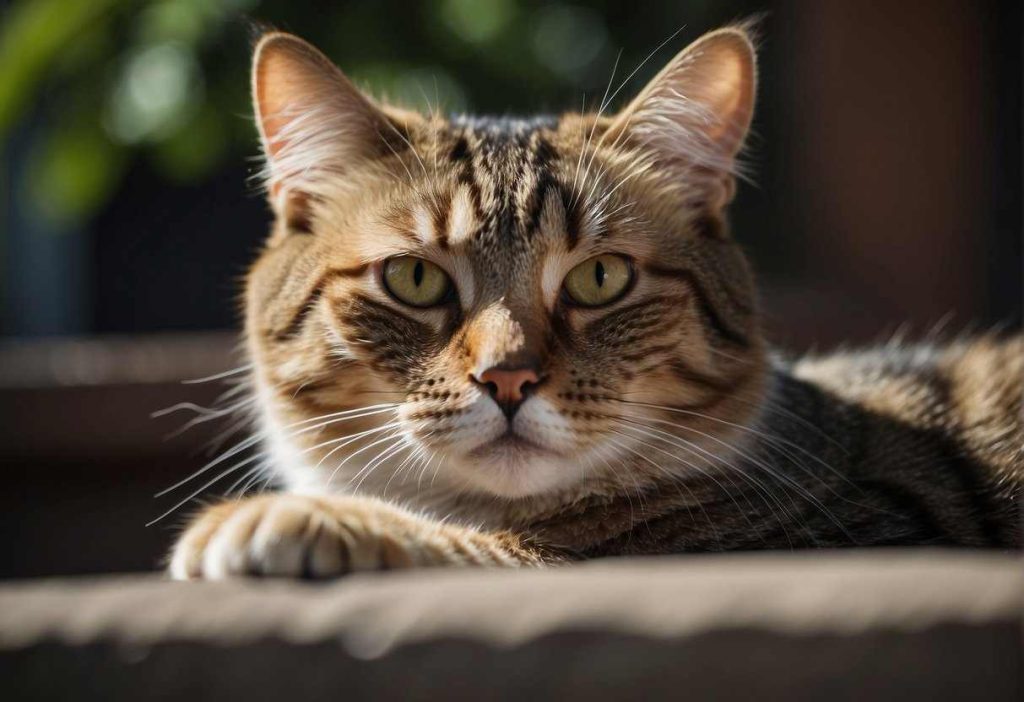
When your cat’s behavior changes, showing signs of pain or suffering, you might find yourself facing the heart-wrenching dilemma of euthanasia.
Are there more bad days than good? It’s natural to struggle with this choice, as it can feel like you’re giving up on a beloved family member.
However, it’s really about ensuring a peaceful end and preventing needless suffering.
| Considerations | Description |
|---|---|
| Quality of Life | Is your cat still interested in play and affection? |
| Pain Management | Is your cat’s pain controllable with medication? |
| Daily Functions | Can your cat eat, drink, and use the litter box? |
It’s okay to seek support. Talk to your vet, share how you’re feeling with friends or a support group. They can help frame your decision within the context of your cat’s well-being.
Sometimes we get so close to a situation, that it’s tough to see it clearly, and an outside perspective can be invaluable.
When making this decision, remember it’s about your cat’s comfort, not the feelings of loss you anticipate.
Assess your cat’s days and the joy they experience. If discomfort outweighs happiness, you’re not failing them by choosing to prevent further suffering—it’s a final act of love.
Have a plan for the end-of-life process.
Will you choose at-home euthanasia or go to the vet’s clinic? Who do you want to be there with you? It’s a time to say goodbye most peacefully and lovingly as possible.
Emotional Support for Pet Owners
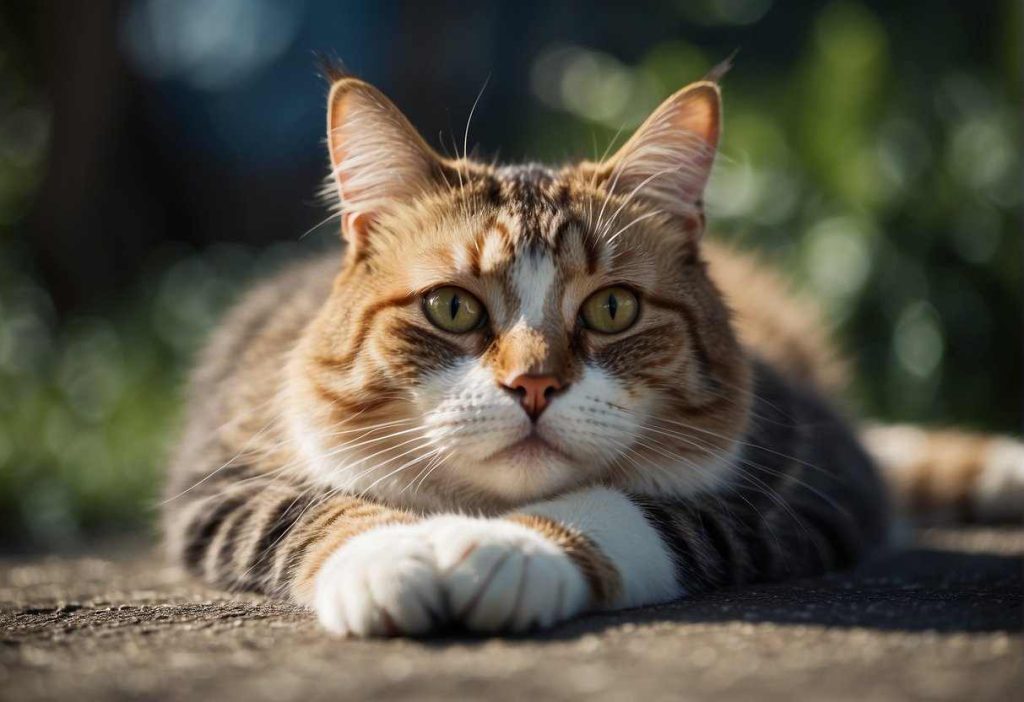
Have you thought about how you’ll cope with the loss? It’s perfectly normal to seek support during this tough time. Here’s how to navigate these choppy emotional waters.
- Lean on Your Social Circle: Don’t shy away from talking to friends and family. They know how much your cat means to you and can offer a comforting shoulder to lean on.
- Join Support Groups: Connect with others who have been in your shoes. They understand your pain and can offer insight. Online forums and local pet loss groups are great places to start.
- Consider Professional Help: If the grief feels overwhelming, a counselor specializing in pet loss can guide you through your emotions.
Emotional support comes in many forms:
| Support Type | Description | How to Access |
|---|---|---|
| Family & Friends | Personal connections for direct support. | Reach out to your loved ones. |
| Online Forums | Communities sharing similar experiences. | Look up forums dedicated to pet loss. |
| Professional Help | Trained experts in dealing with grief. | Find a therapist who specializes in pet loss. |
It’s also helpful to:
- Create Rituals: Memorialize your cat in a way that’s personal to you. This could be through planting a tree, donating to animal charities in their name, or simply framing your favorite photo of them.
- Maintain Routine: Keep up with your daily activities as much as possible. It can provide a sense of normalcy and structure during a time of loss.
Remember, it’s okay to grieve and it’s okay to seek support. You’re not alone in this journey, and there’s help out there whenever you’re ready to reach out.
Communication with Family Members

When your beloved cat isn’t doing well, what’s your game plan?
You may notice changes in their behavior or health that signal the end could be near. It’s essential to talk to your family about what’s happening.
Like a family meeting, gathering everyone to share observations can ensure you’re all on the same page.
Who has noticed changes? Let’s jot it down:
- Decreased interaction
- Changes in vocalization
- Less interest in surroundings
Discussing the nitty-gritty details might be tough, but it’s vital for your cat’s comfort and your peace of mind.
Whether it’s a gradual decline or a sudden change, deciding on care completely depends on open communication. Here’s a checklist to guide the convo:
- Symptom spotting: Who’s seen what and when?
- Care options: Vets, palliative measures, or more?
- Hard choices: If and when to consider euthanasia.
The grief journey—it’s real, and it’s a roller coaster.
Have you talked about how you’ll cope?
Whether it’s sharing stories or crying it out, support from each other can be your anchor. Here’s a tip: create a memory box or a photo album together. It might just bring a chuckle amid the tears.
Remember, your cat relies on you for comfort in their twilight hours. Your clarity and compassion in discussing their care will pave the way for a peaceful transition.
Keep everyone in the loop—because, in times like these, family is everything.
Logistics of Aftercare
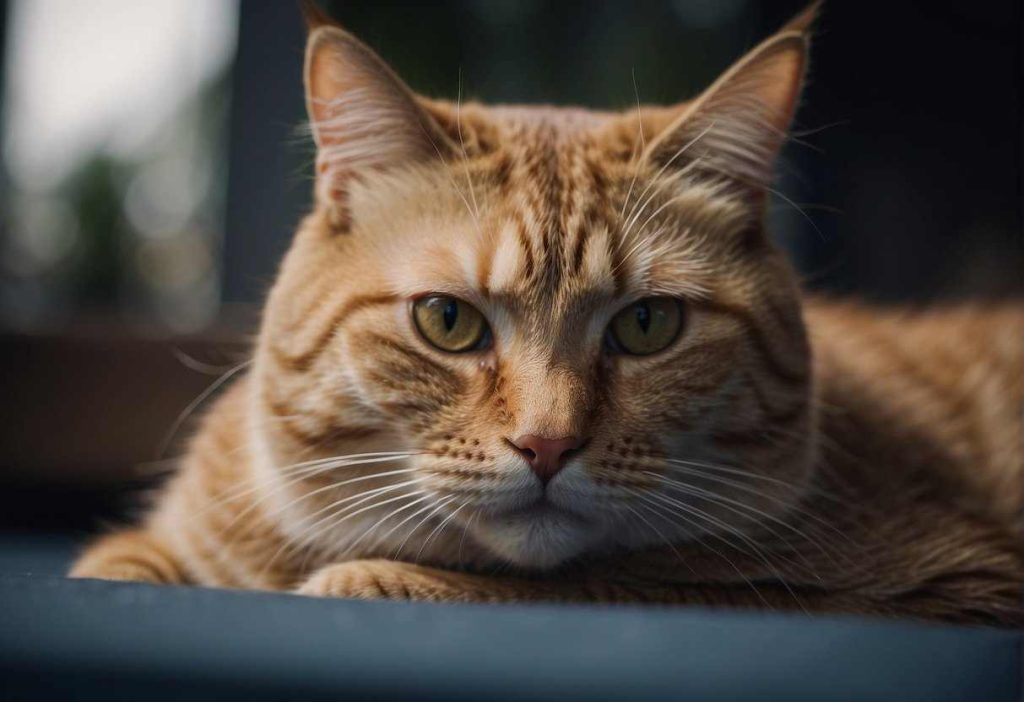
Transportation:
How will you move your pet? It’s wise to arrange transportation ahead of time.
Keep a cozy blanket handy to wrap them gently.
Cremation or Burial:
Decide between cremation and burial.
For cremation, local laws may apply. Some areas require you to use pet cemeteries. Check regulations in advance.
- Cremation Services:
- Communal: Less costly. You won’t receive the ashes back.
- Private: More expensive. You’ll get your cat’s ashes to keep.
- Burial:
- Home Burial: Ensure it is legal in your area. Select a tranquil spot.
- Pet Cemetery: A dedicated resting place. Costs vary based on the plot and services.
Paperwork:
Keep your pet’s records updated. Some regions require a death certificate for pets.
Memorialization:
How will you honor your pet’s memory? Some ideas:
- A digital photo album
- Planting a garden
- A keepsake, like a paw print
Remember, taking care of these details amidst grief can be tough.
Don’t hesitate to ask for help from friends or family. They can handle calls or arrangements while you cherish the final moments with your companion.
Navigating Grief and Loss
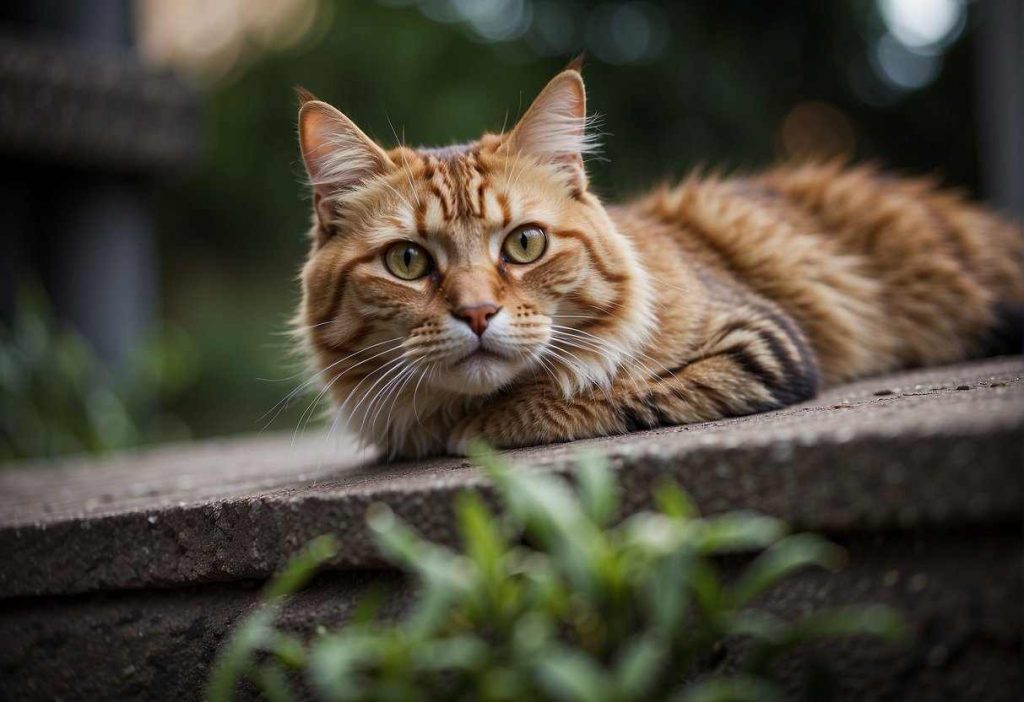
Losing a beloved cat is deeply personal, and it’s okay to feel a whirlwind of emotions. Have you found yourself reminiscing about the good times, or perhaps you’re unsure how to move forward?
You’re not alone. Here’s a simple guide to help you through this tough time:
- Accept Your Feelings: It’s natural to feel sad, angry, or confused. Acknowledge these emotions; they are part of the healing process.
- Seek Support: Talk about your feelings with friends, and family, or join a pet loss support group. Sometimes, just knowing others understand your loss can be comforting.
| Forms of Support | Description |
|---|---|
| Family & Friends | Share memories and lean on each other. |
| Support Groups | Connect with others experiencing similar grief. |
| Counseling | Professional help can guide you through your emotions. |
| Online Forums | Share your story and read about others coping with loss. |
- Create a Memory: Whether it’s a photo album, a planted tree, or a special keepsake, commemorating your cat can provide solace.
- Look After Yourself: Keep up with routine, eat well, sleep, and allow yourself to grieve. Remember, self-care is crucial in these times.
- Give it Time: Grief doesn’t have a timeline. Be patient with yourself as you gradually find your new normal without your furry friend.
You might wonder if you’ll ever feel ‘okay’ again.
While the void left by your cat’s absence might never fully close, the sharp pain of loss will soften over time as you cherish the bond you shared.
Remember, it’s about taking small steps and finding a new way to incorporate their memory into your life.
Additional Resources and Support
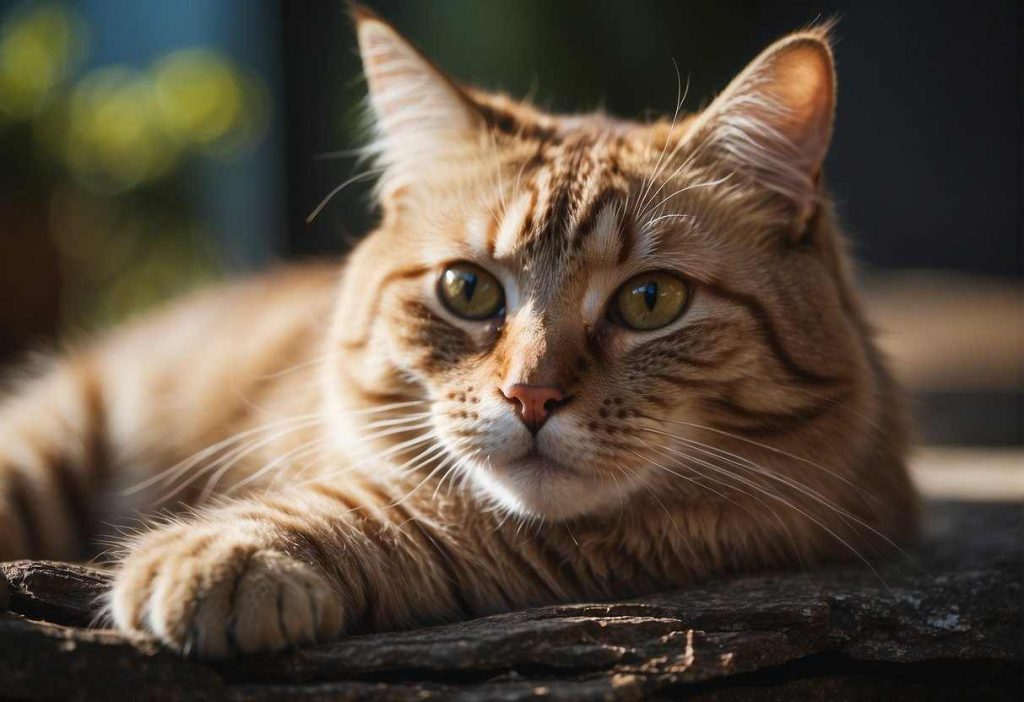
If your cat is approaching their final days, you might find yourself in desperate need of guidance. Who can you turn to for support? You’re not alone, and there are several resources available to help.
Local Veterinarians:
- Medical advice on symptoms and possible treatments
- Comfort care options for your cat’s final days
Support Groups:
- Shared experiences
- Emotional support
- Coping strategies
Hotlines:
- ASPCA Pet Loss Hotline: (847) 227-8357, an ear for your grief and concerns
- C.A.R.E. Pet Loss Helpline: (877) 394-CARE (2273), guidance for bereavement
Online Resources:
- International Association of Animal Hospice and Palliative Care (IAAHPC): A repository of information on end-of-life care
- Pet Loss Help: Offers comprehensive details on understanding grief
Books:
- “Final Journey: Understanding the Loss of a Pet” by Marty Tousley
- “Coping with Sorrow on the Loss of Your Pet” by Moira Anderson Allen
Remember, everyone’s path to healing is unique, and finding the right resource for you is paramount.
Lean on these tools, and know you’re surrounded by understanding and compassion in this tough time.
Quick Recap
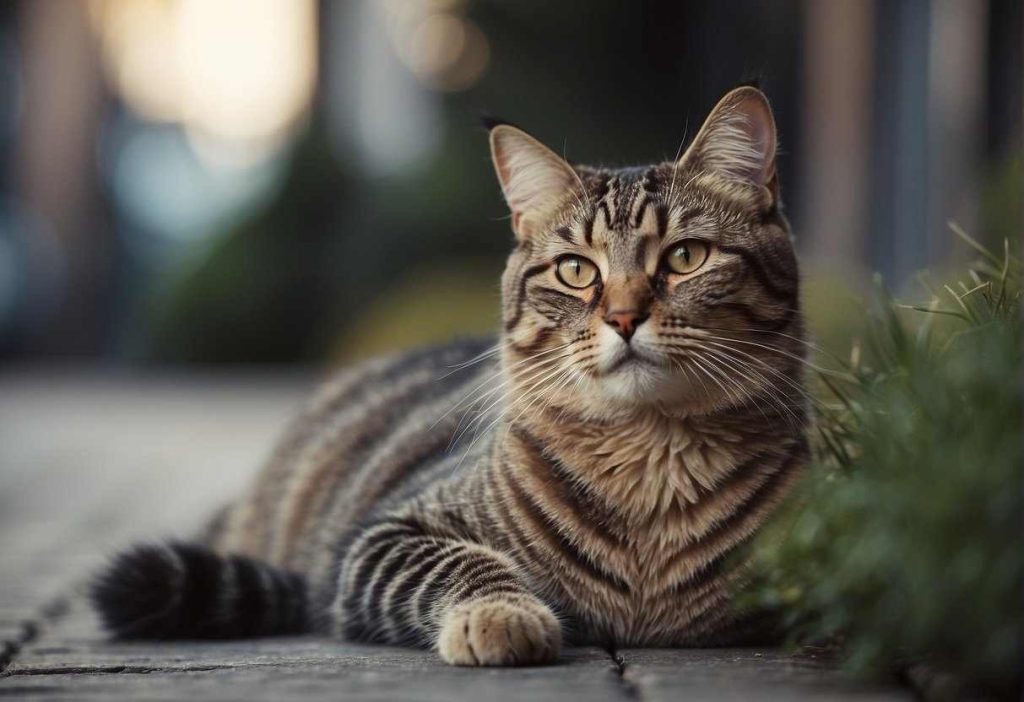
Spotting the Signs:
- Decreased Appetite: Your cat may lose interest in food.
- Behavioral Changes: They might seek solitude or display irritability.
- Physical Decline: Noticeable weight loss, weakness, or changes in grooming habits can occur.
Comfort is Key:
- Provide a warm, quiet space for your cat.
- Maintain accessibility to food, water, and litter boxes.
- Soft bedding and gentle attention can soothe your cat.
Making Decisions:
- It’s tough, but planning helps manage the process.
- Consult your vet for palliative care options to ease discomfort.
Support Networks:
- Reach out to friends, family, or pet support groups.
- Consider counseling or online forums for emotional support.
Self-Care:
- Take time for yourself. It’s okay to feel sad or overwhelmed.
- Acknowledge your feelings and find solace in your memories.
Remember, you’re not alone.
It’s natural to seek companionship while navigating these changes. Together with your vet and support network, you can ensure your feline friend’s comfort and dignity during this time.
Frequently Asked Questions
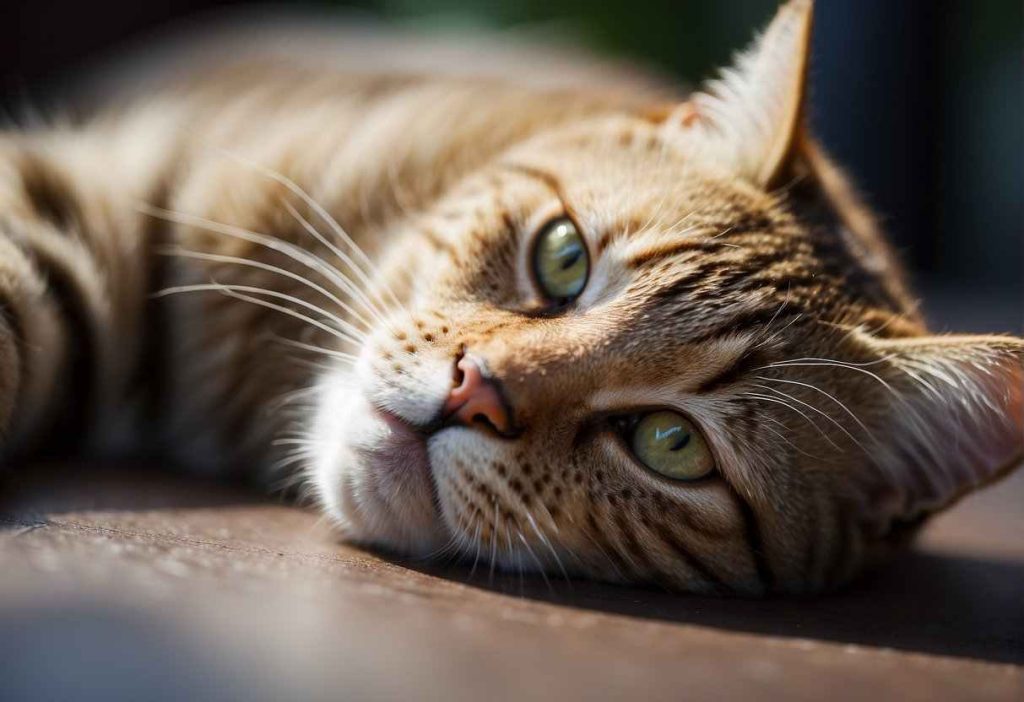
Knowing the end is near for your furry companion can be heart-wrenching. Recognizing the signs ensures you can provide the comfort and care they need in their final moments.
What are the first signs that indicate my cat may be dying?
Changes in behavior, such as decreased appetite, less social interaction, and altered sleeping patterns, often signal that a cat’s health is declining.
They may also show reduced mobility and a lack of interest in their surroundings.
Does a cat’s eyes change when they are near the end of their life?
Yes, a cat’s eyes can indicate their health status.
Near the end, you might notice dullness or cloudiness in their eyes, and they may not react to light as readily or appear sunken.
Can cats show signs of wanting to be alone when they are close to death?
Absolutely. Cats often prefer solitude when they’re not feeling well.
If your cat is seeking isolation more frequently, this might be a sign that they are preparing for their final rest.
How do cats behave when they are dying of cancer?
Cats with cancer can exhibit a range of symptoms, including weight loss, lethargy, and possibly visible tumors or swelling.
They may also react differently to being touched if it causes them discomfort.
How can I emotionally prepare for the loss of my cat?
It’s okay to grieve. Seek support from friends, family, or pet loss support groups.
Take time to cherish your remaining moments together and remember the happy times you’ve shared.
What pain management options are available for my dying cat?
There are a variety of pain management strategies including medication, such as opioids or anti-inflammatories, and alternative treatments, like acupuncture.
Consult your vet for the best approach tailored to your cat’s needs.
When should I consider euthanasia for my cat?
Euthanasia can be a compassionate choice when your cat’s quality of life is severely compromised and pain cannot be managed.
Your vet can help you make this difficult decision based on a thorough assessment of your cat’s condition.

